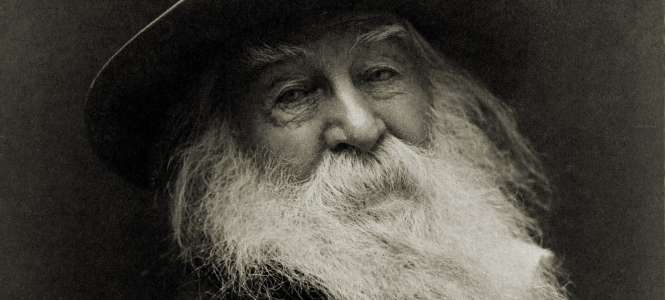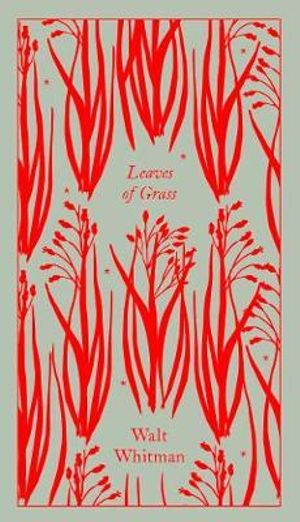
Today marks 200 years since the birth of Walt Whitman, one of the greatest American poets.
He was one of nine children, born May 31, 1819, in Long Island, New York, where he lived and worked as a printer, journalist, and editor without any formal education.
Walt Whitman’s body of work is phenomenal for its poetic experimentation, vitality, and candour, qualities which made him a divisive figure in his lifetime. Whitman’s most well-known work, the 12-poem volume of poetry entitled Leaves of Grass (1855), took him a lifetime to refine, and it stands today as a rhapsodic celebration of individuality, freedom, democracy, sexuality, and nationhood.
To celebrate the 200th birthday of the father of free verse, I thought I’d round up a couple of my favourite Whitman poems.
‘Song of Myself’
This is perhaps the quintessential Walt Whitman poem, one that shows the poet at the full command of his talent. It was one of the original 12 poems in the first edition of Leaves of Grass (1855), and Whitman would continue to work on it until his death.
Written in gloriously unfettered free verse, ‘Song of Myself’ is a joyful celebration of life and nature, in which the speaker has transcended the boundaries of the self to unite all living things.
At 52 stanzas, ‘Song of Myself’ is a long poem but so worth the read.
I celebrate myself, and sing myself,
And what I assume you shall assume,
For every atom belonging to me as good belongs to you.
I loafe and invite my soul,
I lean and loafe at my ease observing a spear of summer grass.
Read the rest here.
‘O Captain! My Captain!’
Yes, this is the one poem everyone mostly only knows because of Dead Poets Society and yes of course I’m going to include it in this list, what do you take me for?
This poem was one of many that Whitman wrote after the death of Abraham Lincoln in 1865 and it’s a beautifully mournful elegy to the fallen president.
O Captain! my Captain! our fearful trip is done,
The ship has weather’d every rack, the prize we sought is won,
The port is near, the bells I hear, the people all exulting,
While follow eyes the steady keel, the vessel grim and daring;
But O heart! heart! heart!
O the bleeding drops of red,
Where on the deck my Captain lies,
Fallen cold and dead.
Read the rest here.
I Sing the Body Electric
Another one from Leaves of Grass, ‘I Sing the Body Electric’ is another one of Whitman’s most well-known poems.
In this free-verse poem, he celebrates the total union of body and soul as one perfect entity, proclaiming that to injure the body is also to injure the soul. Whitman used this poem to reaffirm the beauty and sacredness of every human body of every race, male and female, and it is one of his most beloved poems.
I sing the body electric,
The armies of those I love engirth me and I engirth them,
They will not let me off till I go with them, respond to them,
And discorrupt them, and charge them full with the charge of the soul.
Was it doubted that those who corrupt their own bodies conceal themselves?
And if those who defile the living are as bad as they who defile the dead?
And if the body does not do fully as much as the soul?
And if the body were not the soul, what is the soul?
Read the rest here.
O Me! O Life!
This short poem is Whitman’s answer to the great question of life’s purpose. In this brief, riotous burst of poetry, Whitman proclaims that the mere fact of our existence is reason enough for us to live it to the full – and who can argue with that?
Oh me! Oh life! of the questions of these recurring,
Of the endless trains of the faithless, of cities fill’d with the foolish,
Of myself forever reproaching myself, (for who more foolish than I, and who more faithless?)
Of eyes that vainly crave the light, of the objects mean, of the struggle ever renew’d,
Of the poor results of all, of the plodding and sordid crowds I see around me,
Of the empty and useless years of the rest, with the rest me intertwined,
The question, O me! so sad, recurring—What good amid these, O me, O life?
Answer.
That you are here—that life exists and identity,
That the powerful play goes on, and you may contribute a verse.
Read it here.
If you have a favourite Walt Whitman poem, tell us in the comments!

Leaves of Grass
As Malcolm Cowley says in his introduction, the first edition of Leaves of Grass 'might be called the buried masterpiece of American writing', for it exhibits 'Whitman at his best, Whitman at his freshest in vision and boldest in language, Whitman transformed by a new experience.'
Mr Cowley has taken the first edition from its narrow circulation among scholars, faithfully edited it, added his own introduction and Whitman's original introduction (which never appeared in any other edition during Whitman's life), and returned it to the common readership to whom the great poet really speaks.
About the Contributor
Olivia Fricot
Olivia Fricot (she/her) is Booktopia's Senior Content Producer and editor of the Booktopian blog. She has too many plants and not enough bookshelves, and you can usually find her reading, baking, or talking to said plants. She is pro-Oxford comma.
Follow Olivia: Twitter





Comments